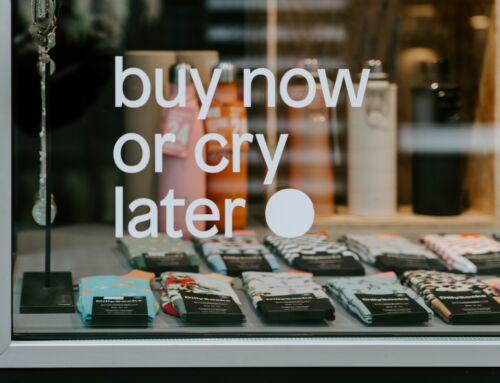In most of the consultations I have with clients, sooner or later we get to the website. In my opinion, the website is a kind of mirror of your business. It evolves and grows with you. And it usually shows your roots, the state your business is currently in, and the challenges you are facing.
I don’t look at websites in isolation, but I compare them to the people they belong to. Sometimes the presentation is completely in line with the person. But more often it goes in a slightly different direction. It shows things that the entrepreneur in question hasn’t noticed yet, hasn’t paid attention to, or simply hasn’t had time to do. And that’s a pity, because the website can be your most powerful business tool.
Is it even necessary to have a website?
I know entrepreneurs who successfully operate without their own websites. Instead, they have social networks, a simple landing page in an e-mailing program, or a listing in one of the business directories. So if you feel that you can run a business without a website, I would have agreed with you a few years ago.
But nowadays, I definitely recommend entrepreneurs to have their own website. Social media reach is declining, the rules are changing. That’s why I don’t think it’s wise to build a reputation on other people’s platforms. Social networks, landing pages and various catalogs can be a great addition. But it makes sense to me to have your own place on the internet that you have full control over.
Your website is the center of your digital ecosystem, just like a brick-and-mortar store. What matters is the impression a customer has when they enter, and also what they think of you before they cross the threshold. Leland Dieno
What does your website say about you?
You can usually tell the following five things from your website.
Who you are and what your business is about
This is more accurately the thing that should come from your website, but it doesn’t always. Plus, you can’t usually tell on your own. Because you know what your business is about and what makes you special. The question is whether anyone else will understand that from your presentation.
So test it out. Show your homepage to a few people. Ideally, don’t include your partner or your mother, but a few actual customers.
Ask specific questions. For example:
- What does my website say I do?
- How am I different from my competitors?
- What group of people am I targeting?
The results may surprise you. Because the things you perceive are far from being readable on the outside. The second thing is how much courage you have to stand up for your work. And write what you really feel inside in your opening tagline. Sometimes it’s a challenging process, but the results are worth it.
How serious are you about business
Do you see what you do primarily as a business or is it more of a hobby? I have nothing against hobbies at all. I’m just of the opinion that it shouldn’t be mixed. When you have a website primarily for fun, you update it usually when you feel like it. Not when something changes in your reality. Also feel free to be on the solution for free so it doesn’t cost you a penny. And it doesn’t matter so much if it flashes foreign banners or contextual links.
Contrast that with a professional website:
- It has its own domain. This means that there is nothing else between your name and the domain extension.
- It hangs on its own hosting or paid platform. One that guarantees functionality, reliability and ad-free operation.
- It is up to date. So it contains your current service offer, current prices and functional contacts. Conversely, it won’t contain three-year-old seminars that you can’t sign up for anymore, or photos of you that don’t resemble each other.
- It works. Buttons call up relevant actions, links lead somewhere, menu items don’t end with an error page, and a completed contact form actually arrives in your inbox. Mistakes can and do happen, of course, but an overall neglected website is easy to spot.
- It adheres to your graphic style. It fits together with your business cards, your social media graphics and your house sign. It uses the same colors, fonts and graphic elements that make you clearly recognizable.
If your website is a business tool and a calling card to your customers, it should meet all the professional requirements.
You don’t need a perfect website. You need a website that delivers results. Michal Hudeček
Who is your client
When I look at your website, I can usually put together a basic description of your customer based on it.
- Is it a man or a woman?
- Approximately how old is he or she?
- Is he a business person or a private person?
- Does he have a predominance of fire, water, earth, or air?
- Does he prefer rational arguments, or does emotion play a major role?
- What does he need? What does he come to you for?
- What are his fears and concerns
Try playing this game yourself. And then compare what you find with the characteristics of your ideal client. Does he fit? Or maybe you just got the answer to why you keep getting contacted by certain types of people you don’t want to work with…
A successful website does three things: attracts the right visitors, leads them to the core services or products you offer, and collects contact information for future communication. Mohamed Saad
How much are you willing to sell
Business websites usually have one and the same goal: to sell products or services. This doesn’t mean that you have to have an e-shop on the site. When you’re offering services, it often doesn’t even make sense. There are other ways to get customers to buy. The question is how much you use them on your site.
If you’re reluctant to sell:
- Your site lacks any kind of CTA, or call to action.
- The buttons are small, bland, and at the bottom of the page. Or they’re not on the site at all.
- Individual pages end in dead ends. You give visitors no clues on where to go next.
- The descriptions of products and services don’t include reasons to order them or explanations of who they can help and what they can help with.
- You leave potential customers guessing how to order the service.
- You direct people to a contact page instead of an order form or booking system.
The remedy can start with yourself. Discuss with a therapist or coach what is preventing you from being seen and selling. And only when you’ve worked out the blocks, edit the text on the site. Or do the opposite. Start with the web and let the psyche adjust. I’ve seen both paths work in practice, so just pick the one that’s closer to you.
Where are you going with your business
Your website should show who you will be in 12-18 months. You need to grow into your messaging. Merel Kriegsman
I very much agree with this quote. Because ideally, you should be catching up with your website. But it’s much more common to find it limping along behind you. And the things you claim about yourself on the web don’t really resonate with your current self anymore.
It’s worked well for me to use the web as an anchor. Setting up a vision and a plan for how my business should work a year or two from now. And then embody those ideas in text, photos and graphics.
If you want your website to truly reflect who you are and support your business, I’m happy to take a look. I can help you align your web presence with your personality and guide it to real results. Just make an appointment for a consultation.




